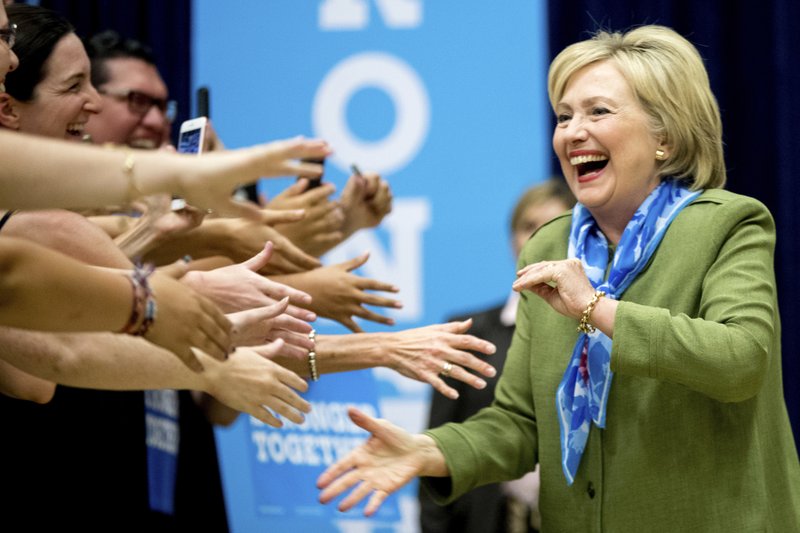DES MOINES, Iowa -- With three months until Election Day, the travel and advertising spending by the two major party presidential candidates offers some insight into their campaigns' post-convention strategies.
RELATED ARTICLES
http://www.arkansas…">Want world peace? Russian says he, Trump could do it http://www.arkansas…">Pre-K support stripped from GOP platform
FULL ELECTION COVERAGE
Rather than scattershot campaign stops across the nation, they are primarily focusing on key areas.
Democratic nominee Hillary Clinton's campaign is focused on the battleground states that have decided the most recent presidential elections. Her campaign booked more than $23 million in new television ad time late last week -- set to start Monday -- spending most of the money in just three states: Florida, Pennsylvania and Ohio.
Meanwhile, Republican nominee Donald Trump's travel since the GOP convention suggests that he's given up on plans to force Clinton to defend traditional Democratic bastions California and New York. Beyond that, it's not clear how he plans to chart his course to reach the 270 electoral votes needed to be elected.
His campaign has yet to run a single television ad. And last week, Trump spent a day in Portland, Maine, going after the single electoral vote at stake along the state's largely Democratic southern coast.
Also, Clinton's team says it isn't ruling out a push in Arizona, which has a booming population of Hispanic voters who, polls indicate, are loath to support Trump. And Georgia, a bastion of the Deep South, echoes recent population trends in other Southeastern states where Clinton is competing aggressively.
But neither of those states is among the 11 battleground states that Clinton's television advertising plans and her travel schedule point to as her focus. The top-tier targets are Florida and Ohio, plus Colorado, Iowa, Michigan, Nevada, New Hampshire, North Carolina, Pennsylvania, Virginia and Wisconsin. President Barack Obama carried them all in 2008, and missed out on only North Carolina during his 2012 re-election campaign.
"The last two elections have given Democrats an electoral path for victory," said Clinton campaign adviser John Anzalone. "And our strategy is to efficiently use our resources to lock down the support we need to reach 270 electoral votes."
After a post-Democratic convention bump for Clinton in national polls and recent Trump campaign gaffes, the number of states in which Clinton will invest her time and money may become fewer than 11, some say.
Confident about Colorado and Virginia, the Clinton campaign passed on giving those states a fresh injection of ad dollars, though they remain heavily staffed with organizers. Likewise, officials with the pro-Clinton group Priorities USA say they have put advertising plans there on hold.
Meanwhile, Trump told The Washington Post last week: "I have states that no other Republican would do well in that I think I'm going to win." He added: "But I don't want to name those states."
Trump and his running mate, Gov. Mike Pence of Indiana, both campaigned Saturday.
At an evening rally at a gymnasium in Windham, N.H., Trump mocked Clinton for saying that she'd "short-circuited" when discussing her email controversy, referring to an interview last week in which Clinton sought to clarify her incorrect claim that FBI Director James Comey had said her answers to the bureau about her use of a private email server were "truthful."
"Honestly, I don't think she's all there," Trump said, adding that Americans "don't want someone who's going to short-circuit."
He had tweeted earlier that, "Anybody whose mind 'SHORT CIRCUITS' is not fit to be our president!"
He also claimed Islamic State militants were "salivating" at the prospect of Clinton's election.
Earlier in the day, Pence made stops in Lawrenceburg, Ind., and Cincinnati.
In Lawrenceburg, Pence delivered pizza and a pep talk to GOP volunteers running a phone bank. In Cincinnati, he stopped at a chili restaurant popular with GOP politicians. There, he shook hands and posed for photos with supporters.
One supporter in Cincinnati offered a riff on the anti-Clinton "lock her up" chant that is commonly heard now at Trump rallies. The woman suggested that the chant should be "lock her out" -- referring to the Oval Office, which drew a laugh from Pence.
Since the end of the Democratic convention last month, there have been no distractions for Clinton's campaign, aside from the candidate's quick stop in Nebraska, a visit that was likely more focused on spending time on stage with billionaire investor Warren Buffett than on picking up the one electoral vote in the Omaha area. Maine and Nebraska are the two states that award electoral votes by congressional district instead of a statewide winner-take-all vote.
This week, both Clinton and Trump plan to be in Florida.
A win there, plus victories in every state and the District of Columbia that have voted Democratic since 1992, would give Clinton a winning total of 271 electoral votes.
For Trump, Florida Republican consultant Brett Doster said simply of his state: "If we don't win here, I just don't see how we win."
Democratic and Republican pollsters said over the past week that Florida is competitive in this year's race and is expected to stay that way into the fall.
The largest share of single-state spending in Clinton's most recent ad buy was in Florida, at more than $4.2 million, and that, plus an aggressive pursuit of Hispanic voters, could give her an edge in that state.
In Orange County, which includes Orlando, the Democratic edge among registered voters has grown by 15 percent since 2008. Since late last year, roughly 1,000 Puerto Rican families a month have relocated to Florida because of the U.S. territory's financial crisis. Many of them are concentrated in and around Orlando's service-sector job market. Bilingual teams of Clinton employees are registering first-time Puerto Rican voters at grocery stores, malls and community centers.
Republican pollster Whit Ayres said Trump's problems in Florida go deeper than his lack of advertising and unpopular standing among Hispanics. He said Trump's recent criticism of the Muslim family of a fallen U.S. soldier is not likely to sit well in a state that has 22 military installations and more than 1.5 million veterans.
"The attack on the Gold Star family makes it unlikely for him to expand in Florida beyond where he is right now," said Ayres, an adviser to Republican U.S. Sen. Marco Rubio of Florida. Gold Star refers to families that have lost loved ones in military service.
While Trump may not have a path forward without Florida, Clinton could lose the state and still find another way through the battleground stages to reach 270 electoral votes.
That's likely why from June 8 through Monday, Clinton and Democratic groups supporting her will have outspent Republican groups by 15 to 1 in battleground states, according to data from Kantar Media's CMAG political advertising tracker.
The Clinton campaign and deep-pocketed Democratic groups such as Priorities USA have poured a combined $66 million into television and radio advertising in those 11 states. Trump's campaign hasn't spent a dollar on television advertising, and Republican groups have spent only about $4.3 million.
Put simply, Anzalone said, Clinton has options. "But this is a dynamic race, and we will continue to look at all pathways as this race develops," he said.
Cutting the ties
Some Republican leaders have concluded that Trump is a threat to the party's fortunes and have begun discussing how soon their candidates, who are facing tough re-election bids, should explicitly distance themselves from the presidential nominee, according to top GOP strategists quoted in The New York Times.
For Republicans in close races, strategists say, the issue is no longer in doubt. One House Republican has already started airing an ad vowing to stand up to Trump if he is elected president, and more are expected to follow.
In the world of Republican super political action committees, strategists are discussing advertisements that would treat Trump's defeat as a given and urge voters to send Republicans to Congress as a check on a Clinton White House. The discussions were described by officials familiar with the deliberations, several of whom spoke on condition of anonymity about confidential planning.
For now, some of the party's most vulnerable incumbents are simply hoping to avoid what they see as the taint of association with their standard-bearer.
Two members of Congress locked in competitive races made themselves scarce when Trump arrived in their states Friday. The two, U.S. Sen. Ron Johnson of Wisconsin and U.S. Rep. David Young of Iowa, held events elsewhere.
U.S. Sen. Patrick Toomey of Pennsylvania, in a conference call with reporters the same day, was less subtle.
"Donald Trump is in a category unto himself," Toomey said, predicting that his state's voters "will make a completely separate decision" between the top of the ticket and the Senate campaign this year.
Plans for ads that distance congressional candidates from the top of the ticket have accelerated.
"You will see them by early to mid-September now," even before the first debate on Sept. 26, said Scott Reed, senior political strategist for the U.S. Chamber of Commerce.
"The conclusion has become that the guy is incorrigible," said Thomas Davis III, a former House member from Virginia who is still close to many of the party's leaders. "He's going to leave our candidates with no choice but to go their own separate way."
Information for this article was contributed by Thomas Beaumont, Julie Bykowicz, Chad Day, Lisa Lerer, Jonathan Lemire and Brian Slodysko of The Associated Press; by Jonathan Martin, Alexander Burns, Giovanni Russonello and John Corrales of The New York Times; and by Jose A. DelReal of The Washington Post.
A Section on 08/07/2016

